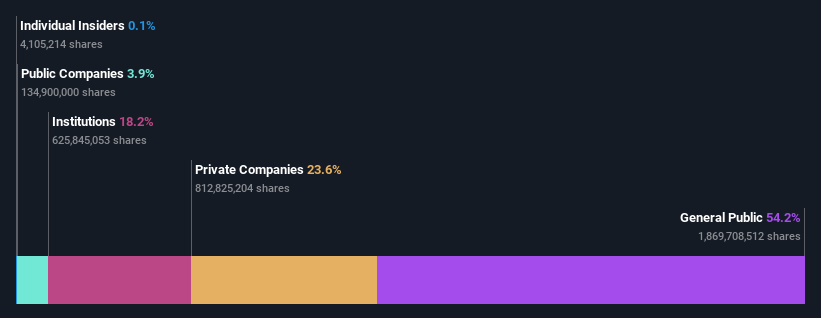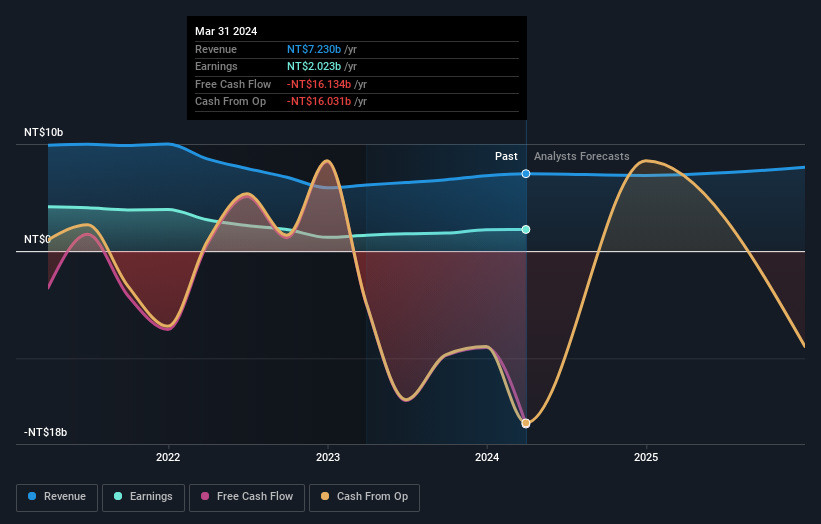- Taiwan
- /
- Capital Markets
- /
- TWSE:2889
IBF Financial Holdings Co., Ltd.'s (TWSE:2889) market cap dropped NT$1.9b last week; Individual investors bore the brunt

Key Insights
- The considerable ownership by individual investors in IBF Financial Holdings indicates that they collectively have a greater say in management and business strategy
- A total of 25 investors have a majority stake in the company with 46% ownership
- Institutions own 18% of IBF Financial Holdings
A look at the shareholders of IBF Financial Holdings Co., Ltd. (TWSE:2889) can tell us which group is most powerful. And the group that holds the biggest piece of the pie are individual investors with 54% ownership. Put another way, the group faces the maximum upside potential (or downside risk).
As a result, individual investors as a group endured the highest losses last week after market cap fell by NT$1.9b.
In the chart below, we zoom in on the different ownership groups of IBF Financial Holdings.
See our latest analysis for IBF Financial Holdings

What Does The Institutional Ownership Tell Us About IBF Financial Holdings?
Many institutions measure their performance against an index that approximates the local market. So they usually pay more attention to companies that are included in major indices.
As you can see, institutional investors have a fair amount of stake in IBF Financial Holdings. This can indicate that the company has a certain degree of credibility in the investment community. However, it is best to be wary of relying on the supposed validation that comes with institutional investors. They too, get it wrong sometimes. It is not uncommon to see a big share price drop if two large institutional investors try to sell out of a stock at the same time. So it is worth checking the past earnings trajectory of IBF Financial Holdings, (below). Of course, keep in mind that there are other factors to consider, too.

IBF Financial Holdings is not owned by hedge funds. The company's largest shareholder is Norwares Overseas Inc., with ownership of 8.1%. For context, the second largest shareholder holds about 4.1% of the shares outstanding, followed by an ownership of 3.9% by the third-largest shareholder.
On studying our ownership data, we found that 25 of the top shareholders collectively own less than 50% of the share register, implying that no single individual has a majority interest.
While it makes sense to study institutional ownership data for a company, it also makes sense to study analyst sentiments to know which way the wind is blowing. There is some analyst coverage of the stock, but it could still become more well known, with time.
Insider Ownership Of IBF Financial Holdings
While the precise definition of an insider can be subjective, almost everyone considers board members to be insiders. Company management run the business, but the CEO will answer to the board, even if he or she is a member of it.
Insider ownership is positive when it signals leadership are thinking like the true owners of the company. However, high insider ownership can also give immense power to a small group within the company. This can be negative in some circumstances.
Our data suggests that insiders own under 1% of IBF Financial Holdings Co., Ltd. in their own names. However, it's possible that insiders might have an indirect interest through a more complex structure. Keep in mind that it's a big company, and the insiders own NT$61m worth of shares. The absolute value might be more important than the proportional share. It is good to see board members owning shares, but it might be worth checking if those insiders have been buying.
General Public Ownership
The general public, mostly comprising of individual investors, collectively holds 54% of IBF Financial Holdings shares. With this amount of ownership, retail investors can collectively play a role in decisions that affect shareholder returns, such as dividend policies and the appointment of directors. They can also exercise the power to vote on acquisitions or mergers that may not improve profitability.
Private Company Ownership
It seems that Private Companies own 24%, of the IBF Financial Holdings stock. It might be worth looking deeper into this. If related parties, such as insiders, have an interest in one of these private companies, that should be disclosed in the annual report. Private companies may also have a strategic interest in the company.
Public Company Ownership
We can see that public companies hold 3.9% of the IBF Financial Holdings shares on issue. This may be a strategic interest and the two companies may have related business interests. It could be that they have de-merged. This holding is probably worth investigating further.
Next Steps:
While it is well worth considering the different groups that own a company, there are other factors that are even more important. Take risks for example - IBF Financial Holdings has 3 warning signs we think you should be aware of.
If you are like me, you may want to think about whether this company will grow or shrink. Luckily, you can check this free report showing analyst forecasts for its future.
NB: Figures in this article are calculated using data from the last twelve months, which refer to the 12-month period ending on the last date of the month the financial statement is dated. This may not be consistent with full year annual report figures.
New: AI Stock Screener & Alerts
Our new AI Stock Screener scans the market every day to uncover opportunities.
• Dividend Powerhouses (3%+ Yield)
• Undervalued Small Caps with Insider Buying
• High growth Tech and AI Companies
Or build your own from over 50 metrics.
Have feedback on this article? Concerned about the content? Get in touch with us directly. Alternatively, email editorial-team (at) simplywallst.com.
This article by Simply Wall St is general in nature. We provide commentary based on historical data and analyst forecasts only using an unbiased methodology and our articles are not intended to be financial advice. It does not constitute a recommendation to buy or sell any stock, and does not take account of your objectives, or your financial situation. We aim to bring you long-term focused analysis driven by fundamental data. Note that our analysis may not factor in the latest price-sensitive company announcements or qualitative material. Simply Wall St has no position in any stocks mentioned.
About TWSE:2889
IBF Financial Holdings
Through its subsidiaries, provides various financial products and services for individual and corporate clients primarily in Taiwan.
Proven track record second-rate dividend payer.


